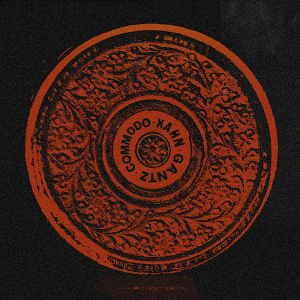Kahn, Gantz, Commodo – Volume 1

There’s often an inability among European and US-American music journalism to process music that sounds ‘different’ to what the writers are used to. Terms like ‘oriental’, ‘Asian” or ‘African’ are used to describe musical elements and in this way get linked with certain imaginations of ‘cultures’. In the case of this collaborative album from Kahn, Commodo and Gantz, some people have marked out the samples or instruments as ‘oriental’, whilst also assigning particular elements to each of the producers. Gantz is responsible for those aspects that sound Arabic or Turkish simply because he resides in Istanbul; the fact Kahn has applied similar samples in the past (“Tehran” for example) doesn’t count. Such attempts at blunt attribution were cast aside by the producers involved, with Gantz taking to Facebook to exclaim “almost every guess about who did which part i read were wrong, which is great!”
It doesn’t really matter who did what for Volume 1. The three producers made an album which is greater than the sum of its parts. A strong connection binds all three; not only through having released on Mala’s Deep Medi before. Kahn, Gantz and Commodo share a similar vision of continuing dubstep’s history. As part of something like a second generation they keep their focus on what dubstep was about when it evolved. One important thing is space, created through minimalistic sound design and using few elements like drums, percussion, bass and the reverb and echo typical of dub music. As one half of Gorgon Sound alongside Neek, Kahn is also presenting his love for dub, reggae and dancehall and as Kahn & Neek they are enthusiastically representing Grime. For which Commodo also shows some love, take his collaboration “Shift” with Grime MC JME for Deep Medi. Gantz worked with lyricist Rider Shafique on his Witch Blues EP, also released through Mala’s label.
Volume 1 is their first joint production and the triumvate go without MCs, though vocals are still present through the usage of samples. Quite possibly an abbreviation for an insulting Turkish expression, lead track “AMK” sets a foreboding tone as it commences with some threatening sounding string-samples. A singing voice and a catchy flute melody join the fray as the introduction builds before dramatically breaking off with a harsh, spoken sample with a fierce laughter. After the drop, a shuffling and heavy beat gains control. Powerful sounds like horns accompany the flute theme of the track that seems to get its characteristic sound from the Ney; an instrument that plays an important role in some music from Persian, Arab, Turkish or Central Asian regions. With heavy sub bass and a beat between dubstep and hip-hop it makes up a strong combination.
As a whole, the six tracks on the album remain on the fine line between latent threat and dreaminess, especially “So Familia” – which introduced the project with a hypnotic, mysterious video – and combines tension and quietness. A corny beat pulsates cautiously as if in fear of awakening a threatening presence. Floating above is a steady piano melody whilst ghostly vocal samples become blurred in the far. “Kibosh” stops the trance with a ringing telephone at the beginning and a hectically stomping beat.
This stomping becomes next level in “Crystal Collect”. The heavy sound system tool starts with a mystical atmosphere before a head banging, ton-heavy halfstep beat takes over. A growling bass line gives support to a whispering swarm of percussive elements and a demanding snare. “Bitchcraft” sees the return of hostile strings, which thrash aggressively over the stepping beat. All tracks are thick and weighty tunes primed for a big sound system and present the mutual approach of Kahn, Gantz and Commodo to Dubstep. Volume 1 is a strong statement that the dubstep sound is still thriving some fifteen years after it first surfaced.
Philipp Weichenrieder
Tracklisting:
A1. AMK
B1. So Familia
B2. Kibosh
C1. Crystal Collect
D1. Bitchcraft
D2. Unmistakable
